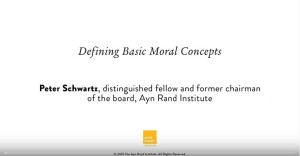 In this talk from the 2015 Objectivist Summer Conference, Peter Schwartz
, author of In Defense of Selfishness, discusses the difficulty in defining moral concepts, among other concepts, due to package deals. Package deals are terms that try to integrate items by non-essentials, treating things that are fundamentally different as if they are the same, creating a pseudo-concept. In the first part of the talk he illustrates how such pseudo or anti concepts are formed using the examples of simplistic, judgmental and unilateralism.
In this talk from the 2015 Objectivist Summer Conference, Peter Schwartz
, author of In Defense of Selfishness, discusses the difficulty in defining moral concepts, among other concepts, due to package deals. Package deals are terms that try to integrate items by non-essentials, treating things that are fundamentally different as if they are the same, creating a pseudo-concept. In the first part of the talk he illustrates how such pseudo or anti concepts are formed using the examples of simplistic, judgmental and unilateralism.
Such pseudo-concepts, in the minds that accept them, result in at best a fuzzy understanding of what they actually mean. At worst, they make it harder, if not impossible, to actually think about the things being referred to.
Just as bad money drives out good, bad concepts drive out good ones. If your mind accepts the pseudo currency of a package deal, it will simply lose the genuine currency of the real concept. So the anti-concept simplistic displaces the concept simplified, the anti-concept judgmental replaces the concept of judgment, the anti-concept unilateralism in foreign policy replaces the concept of self-interest when it comes to a nations foreign policy.
It is package deals that makes people so closed to any logical discussion
After establishing how package deals work, Peter Schwartz applies these principles to looking at the moral concepts of selfishness, altruism and sacrifice. He illustrates for each of these concepts how package deals have been formed that subvert their actual meaning. One surprising thing for me was his discussion of selfishness (at about the 25 minute mark). He takes an approach which is somewhat different to other Objectivist talks by making the compelling argument that we cannot insist that people accept the Objectivist ethics, e.g. that robbing others isn’t actually in your self-interest, before they can have a proper concept of selfishness. He also emphasizes the importance of unpacking the package deal. Until you have done this many people “simply lack the concepts required” to have a logical discussion. Once people are in agreement on the concepts they are much more amenable to argument.
A roughly 40 minute Q&A session follows the talk.
